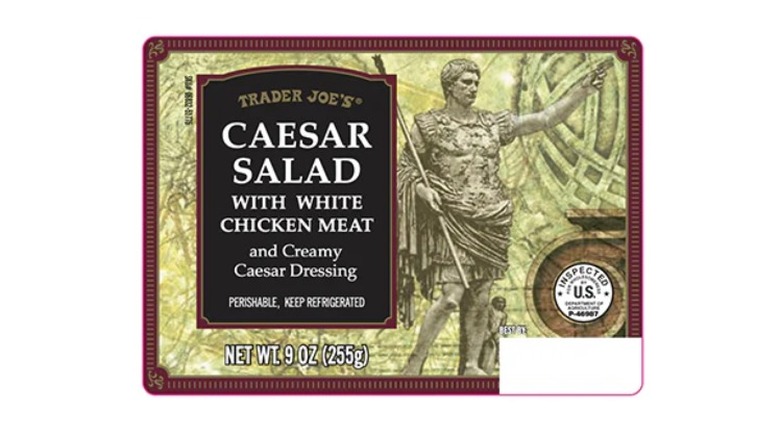Why Trader Joe's Just Declared A Warning For Its Caesar Salad
Trader Joe's customers in Idaho, Washington, and Oregon may need to check their refrigerators for mislabeled salad, especially if they or anyone in their household is allergic to eggs. The California grocery store chain issued a statement on July 12 warning that its pre-packaged Trader Joe's Caesar Salad with White Chicken Meat was sent out with the wrong salad dressing packets.
Instead of the usual creamy Caesar salad dressing, Eat This, Not That reports that the plastic clamshell packages were sent out with packets of the company's sweet and spicy vinaigrette, which contains egg, an ingredient that is not declared on the salads' finished ingredient list. The issue is not prompting a recall in stores because the mistake was only made for one day in the processing facility and the impacted product is no longer on shelves. The company is urging anyone who purchased the salads with "Best By" dates of July 11 or July 12 to either discard the packages or return them to any Trader Joe's location for a full refund. Questions and concerns can be directed to Trader Joe's customer service.
Second recall in two months
This is the second time in recent months that Trader Joe's has had to issue a recall on a pre-packaged salad product. Back in May, the Food and Drug Administration issued a nationwide recall for another Trader Joe's product, the Trader Joe's Lemony Arugula Basil Salad Kit, due to the possibility of undeclared wheat and eggs in the salad from a similar one-day production facility error.
Although Trader Joe's did not report any illness or allergic reactions from either issue, wheat can cause severe illness for people with wheat allergies or celiac disease, and egg allergies can be a significant concern, especially among children and young adults. Mayo Clinic notes that symptoms can range from mild issues like rashes, hives, and congestion, to vomiting, or even– in rare cases– anaphylaxis, while Food Allergy Research and Education calls eggs one of the most common food allergies for children. While most will outgrow the reaction by adolescence, there are adults who will remain allergic.

